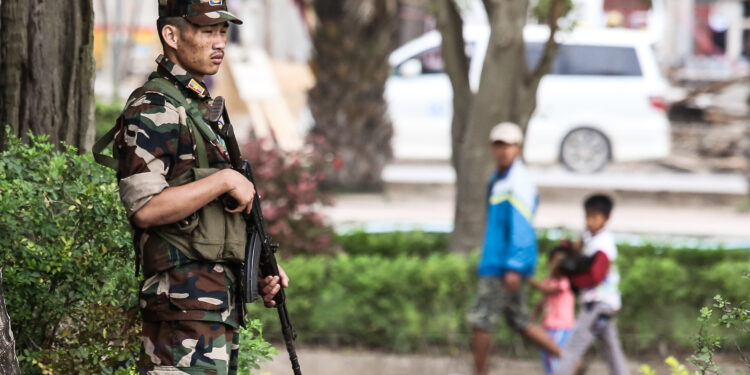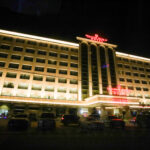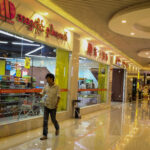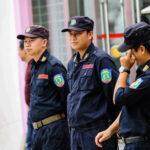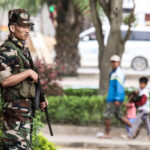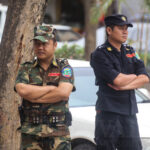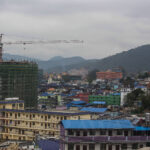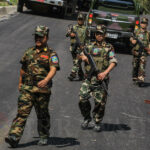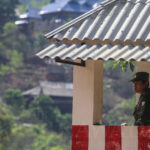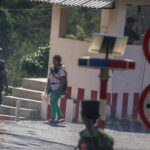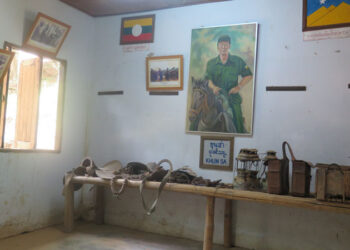MONGLA, Shan State — Leaders of the Mongla rebel group told visiting ethnic leaders and reporters of their achievements in developing Special Region 4 in northeastern Shan State on Tuesday, saying they had “full control” over the area and established “a complete system of government” that provides adequate public services.
“We supply 24 hours of electric power here because we have our own hydropower dam,” a Mongla leader named Sai Mauk told ethnic armed group leaders and journalists during a dinner at Mongla town on Tuesday night.
“Here we run a complete system of government. We did not ask anything from the [central] government for this region’s development. But the government provided us with school teachers and medics for education and health services,” he said, adding that his administration paid the civil servants but operated the schools and hospitals independently.
“We have full power to control our region. If they [the Burma Army] want to cross into our area they have to inform us first,” Sai Mauk said when asked whether the central government has any influence in the region.
Sai Mauk is a leader of the National Democratic Alliance Army’s (NDAA), who were hosting ethnic Mon and Karenni leaders and about half a dozen journalists in Mongla, where the latter group stayed before travelling further west to the neighboring United Wa State Army (UWSA)’s Special Region 2.
From May 1-6, the UWSA is hosting a conference between ethnic groups involved in the drafting of the preliminary nationwide ceasefire accord with the government and several ethnic armed groups that have not directly participated in the process.
The UWSA and NDAA are observers to the ceasefire process but are not members of the Nationwide Ceasefire Coordination Committee (NCCT), which represents 16 ethnic armed groups who reached an in-principle agreement with the government last month on the text for a nationwide ceasefire accord.
Twelve NCCT members will attend the meeting at the UWSA headquarters in Pangshang together with several groups that are not recognized by the government, such as the Kokang and Arakan ethnic rebels currently battling the Burma Army. The meeting will focus on discussing the ceasefire text.
The approximately 3,000-strong ethnic Shan NDAA is one of three armed groups in northern Shan State that was formed when the China-backed Communist Party of Burma collapsed and split in 1989. The ethnic Wa fighters formed the UWSA, a 20,000-strong army equipped with sophisticated Chinese arms, and control the Special Region 2. The ethnic Kokang formed a third, small armed group controlling Laukkai located to the west of the Wa region.
The three border-based groups and former comrades maintain close military links and have been accused of earning income from large-scale drug smuggling and production, gun-running and gambling. Their areas of control—where the Chinese yuan is the main currency—have also seen rapid real estate development, such as hotels, casinos and shops, improved infrastructure and an expansion of rubber plantations.
The groups have had relatively stable ceasefires with the government, but the issue of autonomy for their regions remains unresolved.
Sai Mauk rejected well-documented reports that have described Mongla as a seedy border town known for attracting Chinese gamblers, prostitution and rampant illegal wildlife trade, saying this reputation was based on “wrong information.”
Instead, he boasted of the achievements of his armed group since it signed a ceasefire with Burma’s then-military government in 1989, an agreement that gave it autonomy to administer the 4,950-square-kilometer Special Region 4.
“We are having new road construction projects. Sorry you’re having a hard time to travel here in the meantime,” he told dinner guests, adding that journalists would be welcome to visit Mongla hydropower dam on the Mekong River in the Golden Triangle region situated between Burma, Thailand and Laos.
The NDAA was granted permission by the central government in 2012 to produce 1,000 tons of timber, construct hydropower plants and operate mineral mines in its area.
New Mon State Party leader Nai Htaw Mon told the NDAA leaders that he was impressed with level of development in Special Region 4. “Your region has seen a lot of development—it’s even better than in Yangon, as it has constant electric power,” said the Mon rebel leader.
Rangoon, Burma’s biggest city, is frequently hit by power cuts that last several hours.
Kha Maung, a NDAA Central Committee member, joked that life was pleasant in Mongla and that living in the army-built capital Naypyidaw, situated in sweltering plains of central Burma, would be terrible by comparison.
“We threaten our troops sometimes with sending them to Naypyidaw to be abandoned there—they become really afraid because they know Naypyidaw is a hot and isolated place. They do not want to be there,” he said, prompting laughter from the dinner guests.


